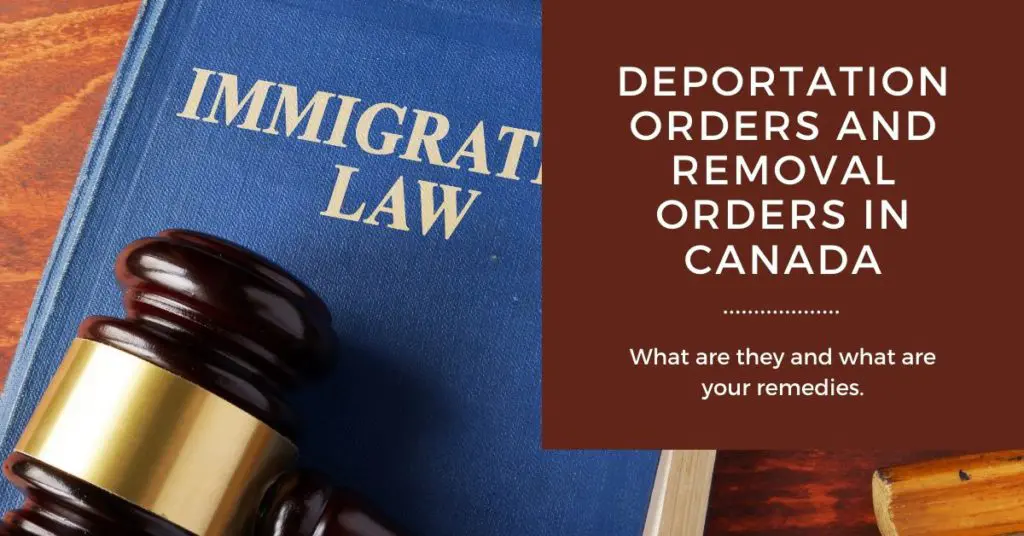What are Removal Orders?
A removal order notifies a foreign national or permanent resident that they cannot legally remain in Canada and must leave Canada.
A deportation order is one type of Removal Order.
In Canadian Immigration Law Removal Orders can be issued by:
- The Immigration Division (ID) or the Immigration Appeal Division (IAD) if they decide to issue a Removal Order.
- A Canada Border Services Agency (CBSA) Officer who after examining a person issues such a Removal Order
- Immigration and Refugees Citizenship Canada or the CBSA in the case of a refugee claim. They will automatically issue a Removal Order. However, the Removal Order will not be enforceable until a refusal or abandonment of a claim.
In Canada, there are three types of Removal Orders that initiate a person’s removal from Canada:
- Departure Order
- Exclusion Order
- Deportation Order
The form number on the document indicates what type of order a person has been issued.
If you receive a removal order it is important to know what type of Removal Order you have been issued.
Departure Orders
A Departure Order requires and orders that a person must leave Canada within 30 days after the order takes effect.
The person who has been issued such an order must also confirm their departure with the CBSA. A person who leaves within the relevant time frame may be able to return to Canada in the future.
A departure order becomes a deportation order if:
- The person fails to leave Canada within 30 days or;
- Fails to confirm their departure with the CBSA.
In order to return to Canada in the future, they would have to obtain an Authorization to Return to Canada (ARC).
Exclusion Order
An Exclusion Order bars a person from returning to Canada for one year.
A person returning before the 12 months have passed, must apply for an ARC.
In the case of determination of misrepresentation, a person cannot return to Canada for up to five years.
In the case where the CBSA paid for the removal of a person from Canada. The person removed must repay the costs associated with their removal.
Deportation Orders
A Deportation Order permanently bars a person from returning to Canada. They may only return with an ARC.
If a person intends to return to Canada they must also repay any costs associated with their removal.
What Happens if I am issued a Removal Order?
Once a Removal Order is enforceable, the CBSA will usually initiate removal proceedings by calling a person to their office.
Failure to appear for a removal interview or on the removal date can lead to a nationwide arrest warrant being issued. Once CBSA has arrested a person who failed to appear, they may detain them. Detention can be in an immigration holding facility or a provincial correctional facility.
What are my options to contest the Removal Order
In some cases, there may be a right of appeal. This is the case for permanent residents in some circumstances. For more information click here.
There is no right of appeal in the following cases:
Individuals do not have a right of appeal in the case of the following circumstances:
- A person is inadmissible to Canada due to Serious criminality and the following circumstances are applicable:
- The person was punished in Canada by a sentence of six months or more of imprisonment, or
- The person was convicted of an offense outside Canada. The offense would be punishable in Canada by a maximum term of imprisonment of at least ten years, or
- The person committed an act outside Canada. The act would be punishable in Canada by a maximum term of imprisonment of at least ten years.
- Organized crime
- Security grounds
- Violations of human or international rights
They may contest the decision at the Federal Court of Canada.
Foreign Nationals may not appeal their Removal Orders. The Removal Order may still be contested at the Federal Court of Canada provided there is merit.
For more information on Judicial Review, this article may be of interest.
Pre Removal Risk Assessment
Individuals who fear to return to their home country can be issued a Pre-Removal Risk Assessment (‘PRRA’).
The Canada Border Services Agency will serve the person with relevant forms and documentation prior to removing them.
For more information on PRRAs this article provides more information.
Stay of Removal and Deferrals
Certain individuals benefit from Administrative deferral of removals (‘ADR’) or Temporary suspension of removals (‘TSR’) or even statutory stays of their removal.
If a removal date is set and the person doesn’t benefit from any stay, they may submit a deferral request to the CBSA.
If one is unsuccessful or if a decision is not rendered in time. A person may seek a judicial stay at the Federal Court to prevent the execution of their removal.
For more information on says and deferrals, this article provides more information.
If you have been issued a removal order and are unsure as to what to do next you may want to contact us. Please note that we charge a consultation fee unless you have a legal aid certificate.
Please note that this is general information and should not be construed as legal advice.

